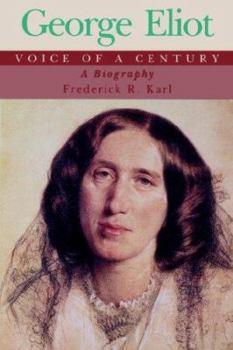George Eliot, Voice of a Century: A Biography
Select Format
Select Condition 
Book Overview
Frederick R. Karl's magisterial biography of George Eliot proves her to be one of the most fascinating and iconic individuals of her time. Born in 1819 as Mary Anne Evans, she grew up near rural Coventry when the pastoral life was being destroyed by the rapid rise of industrialism. Her father, Robert Evans, took care of an estate, where the family lived. Eliot, his youngest child, absorbed the world around her, its beauty and its delicate sense of stability, which was about to be thoroughly disrupted. Eliot thrived on learning while she stayed home, taking care of her aging father. Upon his death, she began her long process of emergence and change. Her unusual intelligence and literary capacity brought her to the attention of John Chapman, who enlisted her to work on the intellectual Westminster Review in London. While there she met some of the leading thinkers of her era, including Herbert Spencer. Karl focuses on her relationships with these men in a way earlier biographers have been unable, using many letters and documents previously unavailable.
Format:Paperback
Language:English
ISBN:0393315215
ISBN13:9780393315219
Release Date:October 1996
Publisher:W. W. Norton & Company
Length:748 Pages
Weight:2.25 lbs.
Dimensions:1.6" x 6.2" x 9.3"
Customer Reviews
2 ratings
The Study of an Amazing Intellect
Published by Thriftbooks.com User , 21 years ago
George Eliot, born Mary Ann Evens, author of arguably the greatest novel in the Victorian era, Middlemarch, was not just an author but an intellectual giant. She translated works of philosophy from the German and from Latin; knew and exchanged ideas with the brightest minds of the time; was fluent in 7 languages (French, Italian, German, Latin, Hebrew, Greek and Spanish), and was compelled by a natural curiosity to acquire knowledge all through her life. Her life with a married man created a Victorian scandal, yet by the time of her death in 1880 she was England?s most celebrated author visited even by Queen Victoria?s daughters.This biography is a thorough, accessible and engrossing book. Author Karl is a fan of Eliot?s yet hides none of her blemishes. While he generally refuses to speculate on a lot of Victorian gossip regarding her life, he at times annoys the reader with some unwarranted attempts to psychoanalyze her (I do get tired of the injection of Freud into literature). The slowest parts of the book deal with her frequent trips to Europe. We learn what she did on Tuesday in Berlin, and then her activities in Hamburg on Wednesday. While I realize that the recording of such information is important in providing a fairly complete detail of her life, I tend to nod a bit at the lengthy reports of her travels.Historically we are blessed with a huge number of extant correspondence of Eliot. The author makes good use of these letters, yet the book does not turn into an epistolary work i.e. a book of nothing but verbatim letters. One of my purely personal problems with the book was that I have not read all of Eliot?s novels. Mr. Karl, of necessity perhaps, relates much of the plots of her books, and thus creates a real spoiler for the novels that I haven?t read. That?s my problem, of course, and not the author?s.It would seem that people today are probably unaware of this important author who was known throughout England during her writing lifetime. Her novels and her life are an important part of the literary canon. I heartily recommend this well crafted book
The Study of an Amazing Intellect
Published by Thriftbooks.com User , 21 years ago
George Eliot, born Mary Ann Evens, author of arguably the greatest novel in the Victorian era, Middlemarch, was not just an author but an intellectual giant. She translated works of philosophy from the German and from Latin; knew and exchanged ideas with the brightest minds of the time; was fluent in 7 languages (French, Italian, German, Latin, Hebrew, Greek and Spanish), and was compelled by a natural curiosity to acquire knowledge all through her life. Her life with a married man created a Victorian scandal, yet by the time of her death in 1880 she was England's most celebrated author visited even by Queen Victoria's daughters.This biography is a thorough, accessible and engrossing book. Author Karl is a fan of Eliot's yet hides none of her blemishes. While he generally refuses to speculate on a lot of Victorian gossip regarding her life, he at times annoys the reader with some unwarranted attempts to psychoanalyze her (I do get tired of the injection of Freud into literature). The slowest parts of the book deal with her frequent trips to Europe. We learn what she did on Tuesday in Berlin, and then her activities in Hamburg on Wednesday. While I realize that the recording of such information is important in providing a fairly complete detail of her life, I tend to nod a bit at the lengthy reports of her travels.Historically we are blessed with a huge number of extant correspondence of Eliot. The author makes good use of these letters, yet the book does not turn into an epistolary work i.e. a book of nothing but verbatim letters. One of my purely personal problems with the book was that I have not read all of Eliot's novels. Mr. Karl, of necessity perhaps, relates much of the plots of her books, and thus creates a real spoiler for the novels that I haven't read. That's my problem, of course, and not the author's.It would seem that people today are probably unaware of this important author who was known throughout England during her writing lifetime. Her novels and her life are an important part of the literary canon. I heartily recommend this well crafted book





